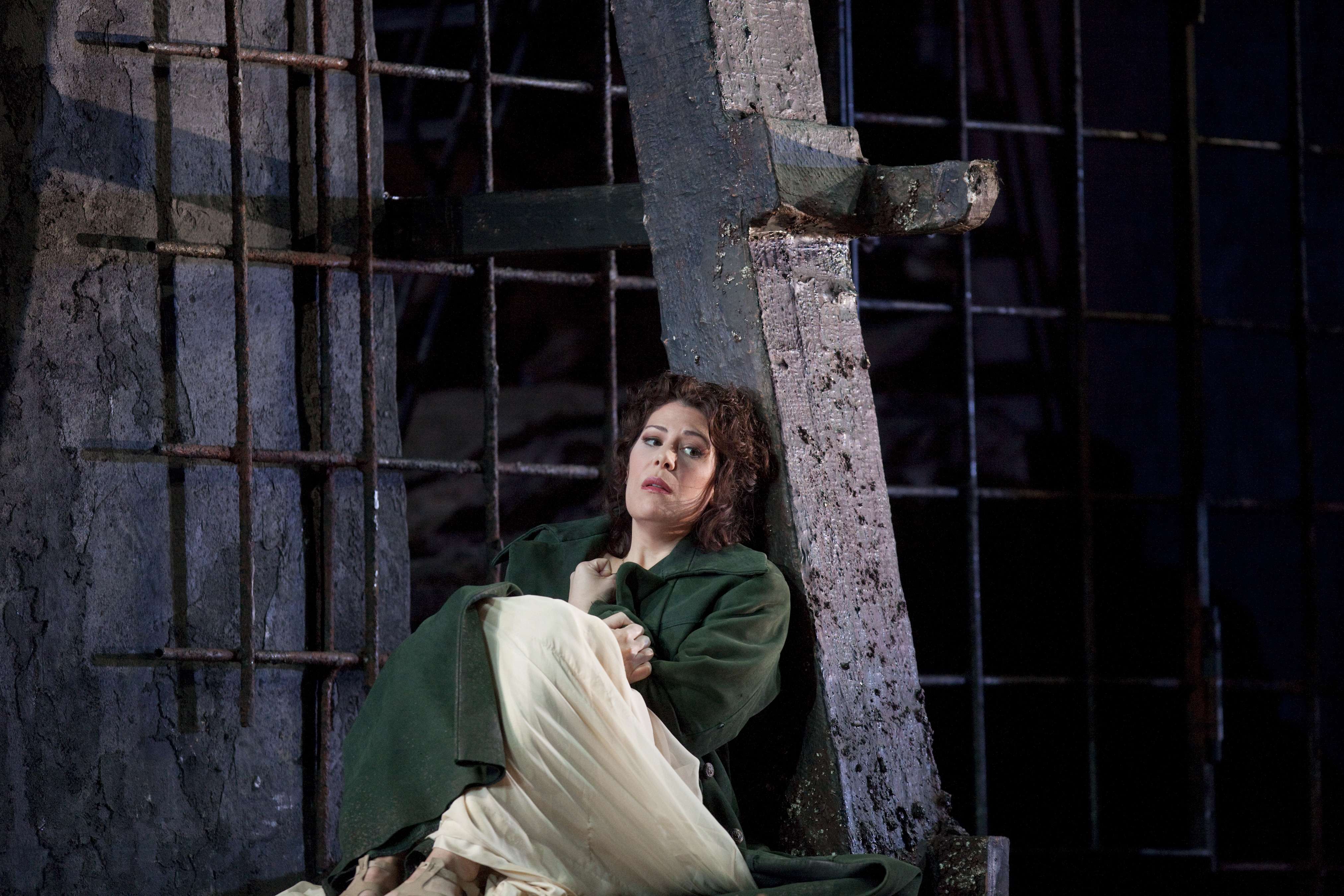|
Back
A Terrific Trovatore! New York
The Metropolitan Opera
04/20/2011 - & October 30, November 3, 6, 11, 15, 19, 2010, April 23, 27*, 30, 2011
Guiseppe Verdi Il trovatore
Patricia Racette/Julianna Di Giacomo/Sondra Radvanovsky* (Leonora), Marianne Cornetti/Dolora Zajick* (Azucena), Marcelo Alvarez (Manrico), Zeljko Lŭcic/Vitaliy Billy/Dmitri Hvorostovsky* (di Luna), Alexander Tsymbalyuk/Stefan Kocán (Ferrando), Renée Tatum/Maria Zifchak* (Inez), Eduardo Valdes (Ruiz)
Metropolitan Opera Chorus, Donald Palumbo (Chorus Master), Metropolitan Opera Orchestra, Marco Armiliato (Conductor)
David McVicar (Production), Charles Edwards (Set Designer), Brigitte Reiffenstuel (Costume Designer), Jennifer Tipton (Lighting Designer), Leah Hausman (Choreographer), Paula Williams (Stage Director)

S. Radvanovsky (© Ken Howard/Metropolitan Opera)
This season’s Met revival of Il trovatore, the first set of encore performances of David McVicar’s superb 2009 production, makes effective use of the stage turntable to move seamlessly between scenes, exposing different faces of the effective and modular set. Most of all, the turntable keeps the musical and psychological momentum from stalling. (For a full discussion of the production, read here).
Marco Armiliato led the Met Orchestra in a correspondingly flowing and energetic reading of Verdi’s score, ably supporting the singers without overpowering them. They shone as did the orchestra. The ever-excellent Met Chorus executed some of Verdi’s most well-known and infectious choral pieces with characteristic precision and panache.
Returning to the role of Leonora, Sondra Radvanovsky began the first act without good control of the unique vibrato that characterizes her voice. But, throughout the evening, her opulent voice steadily gained focus and firmness of tone. Her overall performance – most notably in last act was a triumph. Her shimmering, sorrowful “D'amor sull'ali rosee” had such luminosity, and there was the added thrill of a huge voice perfectly restrained as she despaired of her lover’s life. Her tender warmth turned to steel and fierce joy in her “Tu vedrai che amore in terra” as she resolved to give her own life in an attempt to save him. This gave an added poignancy to “Mira, di acerbe lagrime”, her duet with Dmitri Hvorostovsky’s di Luna. Their voices united in musical ecstasy, but with a chilling cross-purpose as they struck a bargain for Manrico’s life. The music in the orchestra was pure joy, as were the voices, his joyously triumphant with the apparent conquest of Leonora, hers joyously luminous and self-sacrificing as she gives up her life rather than her honor to save Manrico.
The sinister elegance of both the character and much of his music makes the Count di Luna one of Hvorostovsky’s best Verdi roles. The part provides ample opportunity for him to showcase his beautiful legato, graceful phrasing and extraordinary breath control that takes our breath away but never his! His “Il balen del suo sorriso” was finely colored and adoring, convincingly revealing a man genuinely in love, or at least genuinely believing that what he felt was love. His final defeat when he lost both Leonora and the brother he had sought for a lifetime was so crushing – and he embodied that defeat so well dramatically as well as vocally – that he aroused our pity. We almost forgot his cruel and manipulative ways that had brought him to that point.
Marcelo Alvarez was dramatically convincing both as the ardent lover and devoted son. He sang with a sure, even tone and easy top. His final scene with his adopted mother, Azucena, was one of the most moving. He demonstrated exquisite dynamic control, his voice flooding with tenderness and love, as he attempted to sooth his mother’s torment and sing her to sleep. This mother-son scene is easily as affecting as the more common Verdi father-daughter scenes.
Azucena is a role with which Dolora Zajick is much identified. She did not disappoint in this performance, singing with power and gleaming menace, and then revealing her vulnerability in moments of great softness and control. She portrayed a strong woman not quite sane, wracked by guilt and grief, with even her redirected maternal love at last consumed by her thirst for vengeance.
Il trovatore will be broadcast in HD on April 30th. The transmission will reach more than 1,500 move theaters in more than 40 countries. For information and tickets, please follow this link.
Arlene Judith Klotzko
|